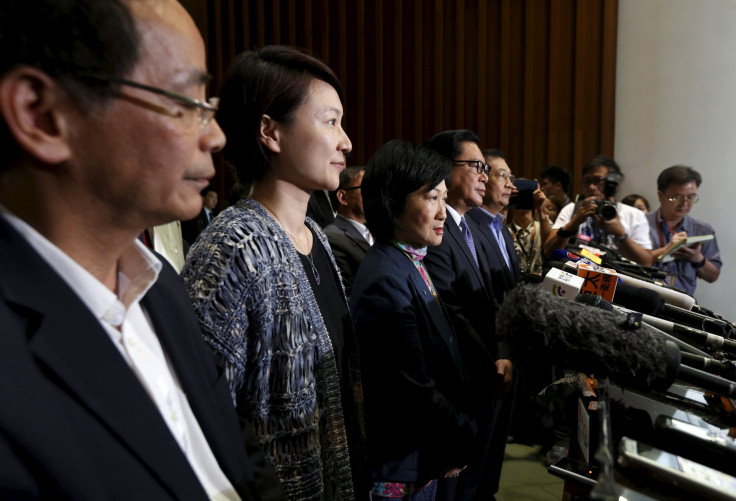Hong Kong's Pro-Beijing Lawmakers Rocked By Gaffes, Scandals

HONG KONG -- It has not been a good week for the city's pro-Beijing lawmakers, who have dominated front pages for several days with a series of embarrassing political missteps.
The group's problems started with the June 18 defeat of a political reform package in the Legislative Council (LegCo), which would have seen the city's next chief executive elected by a popular vote in 2017 -- albeit after candidates had been politically vetted by a pro-Beijing committee.
The demise of the bill, which was strongly backed by China's Communist Party government, had been expected. What was not expected, however, was for the majority of Beijing's supporters in the chamber to walk out just moments before the vote took place.
This left a piece of flagship legislation, strongly supported by both China and Hong Kong's chief executive Leung Chun-ying, with only eight votes being cast in its favor in a chamber of 70 delegates.
Visibly embarrassed lawmakers attempted to explain to reporters after the vote that they were waiting for a colleague who was running late, or said that they had encountered unspecified “issues.” Their political opponents suspected the walkout was a bid to delay a vote by denying the chamber a quorum.
One pro-establishment lawmaker, Regina Ip, subsequently broke down in tears during a radio interview, over her failure to vote for the bill, saying she had “brought shame to the country.”
As recrimination and contrition reverberated through the bloc, a fresh scandal broke: A Chinese newspaper published leaked WhatsApp messages exchanged between LegCo President Jasper Tsang and many pro-Beijing lawmakers during the debate on the bill, in which he seemed to be helping them orchestrate their efforts to arrange the timing of the vote.
Tsang, though a pro-Beijing lawmaker himself, is supposed to remain politically neutral in his role as president of the chamber. However, in one of the messages, Tsang reportedly tells pro-Beijing lawmakers: “Not sure what they [pan-democratic opposition] plan to do. Need to watch out and the top priority is to hold back your speeches.”
Hong Kong's pan-democrats, fresh from their victory in defeating the political reform bill, have called for a public apology, and some have pledged to table a no-confidence motion against Tsang, who has announced that he will not quit over the row.
“I think that this is very significant, because it seems the pro-Beijing camp is in, not complete maybe, but disarray. They are very nervous,” Emily Lau, chairwoman of Hong Kong’s Democratic Party, told International Business Times.
“No doubt Beijing is very alarmed by such developments. They will of course try to find out who leaked the information,” she added.
Some analysts, however, were skeptical that the recent upheavals would have a lasting impact on the pro-Beijing bloc in Hong Kong.
“I think that it was a minor gaffe,” David Zweig, director of the Center on China’s Transnational Relations at the Hong Kong University of Science and Technology, told IBTimes, referring to the leaked messages.
“The democrats are playing politics -- that's one of the reasons they'll say this is a big deal ... is that the pro-Beijing camp has some egg on its face, and the democrats want to keep that egg there,” he added.
Outrage over the leak could also be part of a strategy to divide the central government in Beijing from their allies in Hong Kong, to make it more difficult for them to influence politics in the region, Zweig said.
Such divisions, however, were not on display Thursday night, when Beijing's top official in Hong Kong hosted a reception for the city's pro-establishment lawmakers, where he thanked them for the "hard work and stress" they put into the political reform battle, and notably refrained from taking them to task for the botched vote.
While Hong Kong's move toward becoming a full-fledged democracy may have stalled, following the defeat of the political reform bill, politics in the city, it seems, continues nonetheless.
© Copyright IBTimes 2024. All rights reserved.












